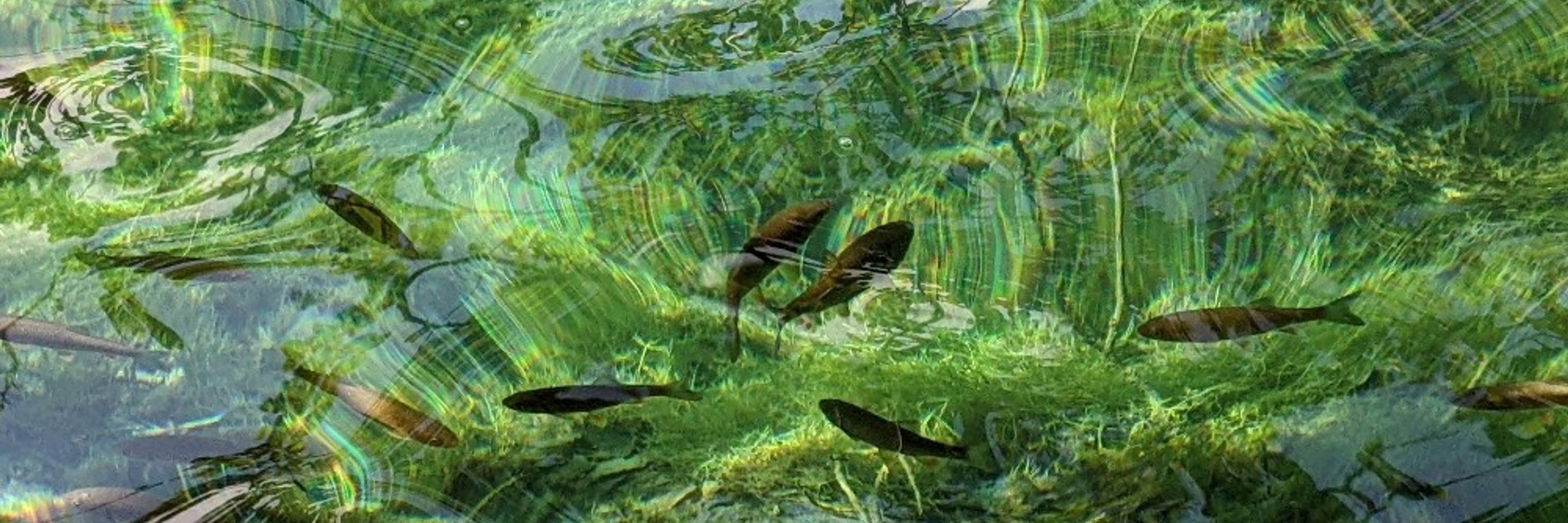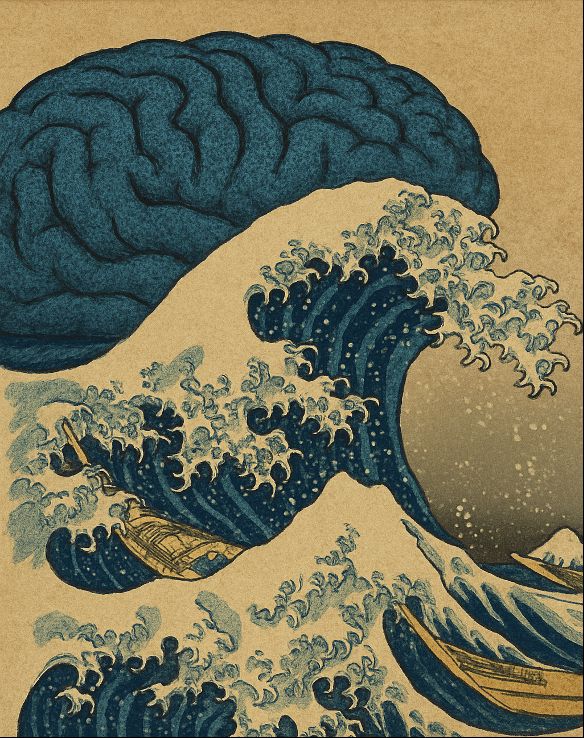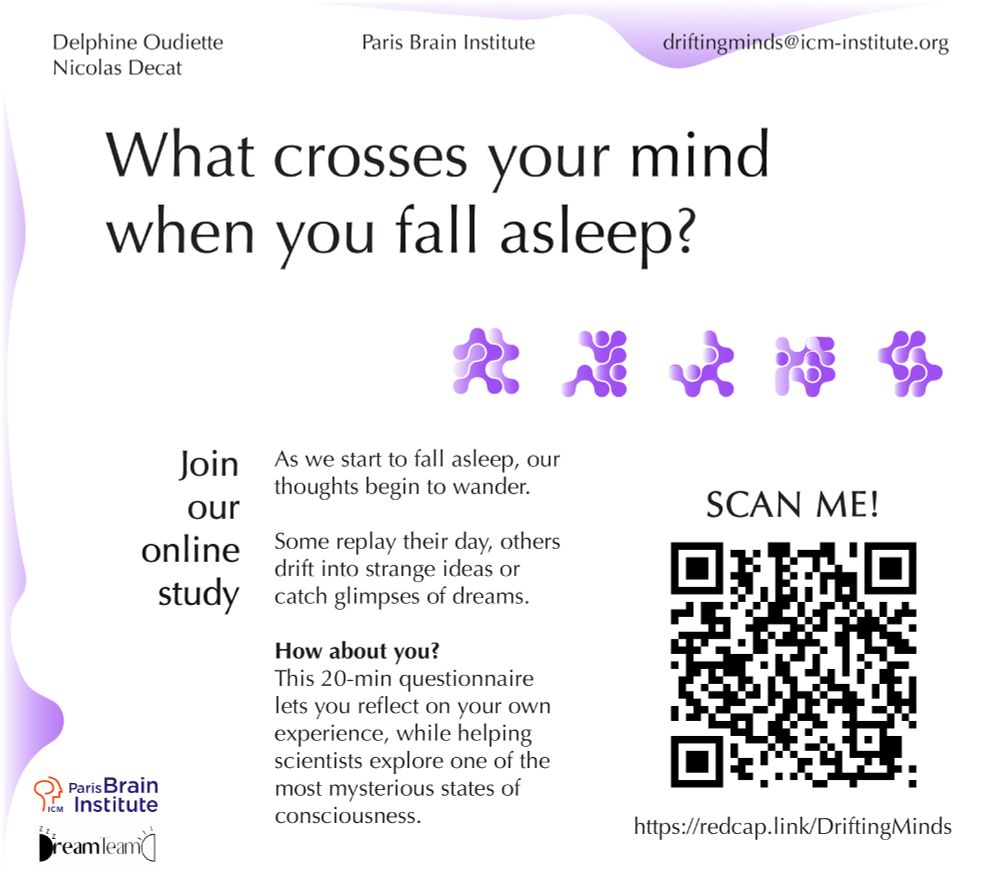
Neuroscientist at the Paris Brain Institute
Chargé de Recherche Inserm
Adjunct Senior Research Fellow at Monash University
Co-Editor-in-Chief of Neuroscience of Consciousness (OUP)
W/ @lucieberko.bsky.social, @standehaene.bsky.social, R Gaillard, and A Salvador, we investigated the impact of ketamine on conscious processing and attention in healthy subjects.
Check the preprint!
www.biorxiv.org/content/10.1...
🧠🧪

W/ @lucieberko.bsky.social, @standehaene.bsky.social, R Gaillard, and A Salvador, we investigated the impact of ketamine on conscious processing and attention in healthy subjects.
Check the preprint!
www.biorxiv.org/content/10.1...
🧠🧪

➡️ NRD is present only in COPD patients
➡️ NRD drops during all sleep stages compared to wake
➡️ NRD is lowest in deep sleep (N3) and REM
➡️ Patients with better sleep quality show larger NRD decreases at night


➡️ NRD is present only in COPD patients
➡️ NRD drops during all sleep stages compared to wake
➡️ NRD is lowest in deep sleep (N3) and REM
➡️ Patients with better sleep quality show larger NRD decreases at night
We measured respiratory muscle activity during polysomnography (sleep) in COPD patients and used an automated approach to extract NRD from thousands of breaths without manual scoring.

We measured respiratory muscle activity during polysomnography (sleep) in COPD patients and used an automated approach to extract NRD from thousands of breaths without manual scoring.


As part of a forthcoming book on consciousness, we wrote a chapter on:
Spontaneous thoughts and experiences across wakefulness and sleep
osf.io/preprints/ps...
with @parboulakis.bsky.social @ademertzi.bsky.social and @jdsitt.bsky.social
A brief 🧵!

As part of a forthcoming book on consciousness, we wrote a chapter on:
Spontaneous thoughts and experiences across wakefulness and sleep
osf.io/preprints/ps...
with @parboulakis.bsky.social @ademertzi.bsky.social and @jdsitt.bsky.social
A brief 🧵!
This idea here was not to get the perfect classifier but to show that the Dream database could help *you* build the next Dreamcatcher!

This idea here was not to get the perfect classifier but to show that the Dream database could help *you* build the next Dreamcatcher!

We confirm dreams are pervasive during sleep and not at all restricted to REM sleep!
[E: experience/dreaming; EWR: E without recall; NE: no experience]

We confirm dreams are pervasive during sleep and not at all restricted to REM sleep!
[E: experience/dreaming; EWR: E without recall; NE: no experience]
We propose a common definition and a consensus methodology to study dreams with a neuroscientific approach!

We propose a common definition and a consensus methodology to study dreams with a neuroscientific approach!
After years of effort led by @qualiastructure.bsky.social (Nao Tsuchiya and William Wong), Jenny Windt, Katja Valli, Valdas Noreika and @rherzoga.bsky.social, the Dream database is now published in @natcomms.nature.com
**A dream EEG and mentation database**
rdcu.be/eAwni

After years of effort led by @qualiastructure.bsky.social (Nao Tsuchiya and William Wong), Jenny Windt, Katja Valli, Valdas Noreika and @rherzoga.bsky.social, the Dream database is now published in @natcomms.nature.com
**A dream EEG and mentation database**
rdcu.be/eAwni
So excited about the upcoming ChatGPT-6 though!

So excited about the upcoming ChatGPT-6 though!


We ran mediation analyses to figure this out!
➡️ SW density mediated ADHD-related increases in omission errors, RT variability, sleepiness, etc...
More than a biomarker, sleep intrusions could represent a mechanism of lapses in ADHD!

We ran mediation analyses to figure this out!
➡️ SW density mediated ADHD-related increases in omission errors, RT variability, sleepiness, etc...
More than a biomarker, sleep intrusions could represent a mechanism of lapses in ADHD!
– ⬇️ with RT
– ⬆️ with RT variability
– ⬆️ with omissions
- ⬆️ with sleepiness

– ⬇️ with RT
– ⬆️ with RT variability
– ⬆️ with omissions
- ⬆️ with sleepiness
In line with our hypotheses, ADHD individuals showed more sleep-like slow waves, especially over parietal & temporal regions.

In line with our hypotheses, ADHD individuals showed more sleep-like slow waves, especially over parietal & temporal regions.
- ⬆️ mind-wandering
- ⬆️ mind-blanking
- ⬆️ sleepiness
These changes were associated with poorer performance, and MW was less intentional than in non-ADHD!
What is driving these behavioural and experiential changes? 🤔

- ⬆️ mind-wandering
- ⬆️ mind-blanking
- ⬆️ sleepiness
These changes were associated with poorer performance, and MW was less intentional than in non-ADHD!
What is driving these behavioural and experiential changes? 🤔
- ⬆️ commission errors (false alarms)
- ⬆️ reaction times variability
A typical pattern in a task challenging sustained attention and response inhibition.

- ⬆️ commission errors (false alarms)
- ⬆️ reaction times variability
A typical pattern in a task challenging sustained attention and response inhibition.
We probed moment-to-moment changes in mental state (on-task, mind-wandering, mind-blanking).
We detected EEG signs of sleep intrusions with sleep-like slow waves (SWs).

We probed moment-to-moment changes in mental state (on-task, mind-wandering, mind-blanking).
We detected EEG signs of sleep intrusions with sleep-like slow waves (SWs).
Sleep-like Slow Waves During Wakefulness Mediate Attention and Vigilance Difficulties in Adult ADHD
We show that intrusions of sleep-like activity during wake help explain attention lapses in ADHD.
🔗 www.biorxiv.org/content/10.1...
#ADHD #Sleep #Neuro

Sleep-like Slow Waves During Wakefulness Mediate Attention and Vigilance Difficulties in Adult ADHD
We show that intrusions of sleep-like activity during wake help explain attention lapses in ADHD.
🔗 www.biorxiv.org/content/10.1...
#ADHD #Sleep #Neuro
We can't go over it,
We can't go under it,
We've got to go through it!

We can't go over it,
We can't go under it,
We've got to go through it!
If you are human, you fall asleep at least once a day! What happens in your mind then?
Scientists know actually very little about this private moment.
We propose a 20-min survey to get as much data as possible!
Here is the link:
redcap.link/DriftingMinds

If you are human, you fall asleep at least once a day! What happens in your mind then?
Scientists know actually very little about this private moment.
We propose a 20-min survey to get as much data as possible!
Here is the link:
redcap.link/DriftingMinds
I don't think they were designed to confront once and for all two theories against each other, and just these two at the exclusion of all others.

I don't think they were designed to confront once and for all two theories against each other, and just these two at the exclusion of all others.



